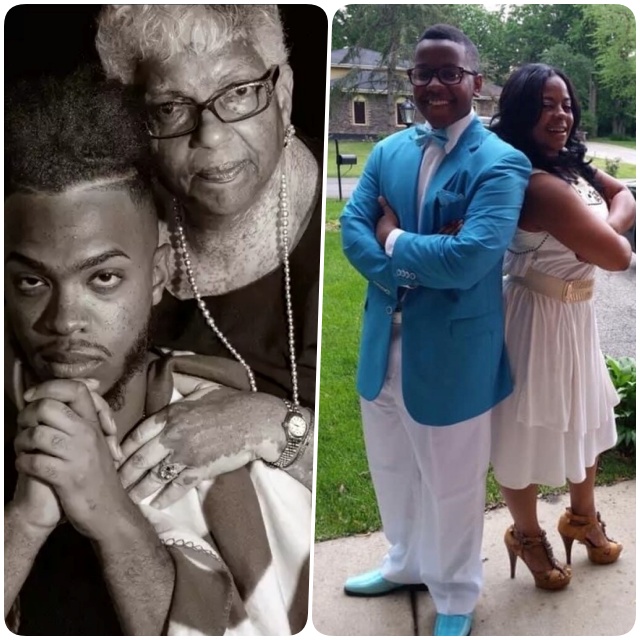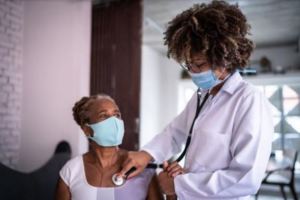By Mylika Scatliffe,
AFRO Women’s Health Writer
Early in the morning of May 27, 2020, Maxie-Cole’s son, Jamal Clay was found by his sister hanging in the garage of their home in the Chicago suburb of Olympia Fields. He was 19-years old and struggled with depression. He made a previous suicide attempt seven years earlier at the age of 12, but this time, he was successful.
Maxie-Cole is a licensed social worker and felt that she was well versed about suicide.

“I work for the Veteran’s Administration and suicide is a very hot and important topic for us. We do a lot of screenings and so forth, but I never thought it was something that would happen in my own home,” said Maxie-Cole.
Jamal’s first suicide attempt was after bullying and body shaming by his peers came to a head after a school camping trip. He came home distraught and tried to hang himself in his bedroom closet.
“We received a diagnosis of depression when Jamal was hospitalized after the first attempt, but it was almost like they were saying a single episode during the school year caused my son to have symptoms that met the definition of depression,” said Maxie-Cole.
A series of events caused his treatment to be delayed. Jamal was released from the hospital with a plan to see a psychiatrist in an outpatient program, but he wasn’t seen until 60 days after his discharge.
“You’re probably asking, why 60 days? Because that was the only appointment available. After that appointment the doctor tells us to continue outpatient therapy. After waiting three weeks for the therapist to come to our house, her car breaks down,” recalled Maxie-Cole. “So my son saw this therapist twice in a month’s time. By the next follow up appointment, the psychiatrist retired.
All of these obstacles caused Maxie-Cole to conclude that as a Black family they would handle Jamal’s issues themselves.
Depression is one of the most common mental disorders in the United States today.
“Major depressive disorder is the psychiatric terminology we use. Depression is a fairly common disorder, and about 20 percent of adults in the United States have an issue with depression,” said Dr. Anique Forrester, a psychiatrist with the University of Maryland Medical Center and an assistant professor of psychiatry at the University of Maryland School of Medicine.
While the overall rates of suicide have decreased in recent years, they are increasing in the Black community. A recent study conducted by the Centers for Disease Control and Prevention found that the overall rate of suicide in the United States decreased by three percent in 2020, but the rates have increased among people of color and young people.
The United States Department of Health and Hunan Services of Minority Health found in 2019 that White people continued to have higher rates of suicide, but it was the leading cause of death among young Black people between ages 15 and 24. Similar conclusions were noted by the Center for Behavioral Statistics and Quality in that the rates of suicide attempts among Black adults were higher than any other racial or ethnic group in 2021.
These alarming statistics make mental health screening more urgent now than perhaps ever before in the Black community. The isolation among young Black people created by the COVID-19 global pandemic exposed struggles with depression and other mental health conditions within our community. Recent celebrity deaths such as Stephen “Twitch” Boss, the DJ on the Ellen DeGeneres Show, and actress Regina King’s only son, Ian King Jr., sent shockwaves throughout the Black community. These deaths have sparked conversation around the historical stigma of depression and suicide among Black people.
“Part of mental health screening is actually normalizing that this is part of your health; your physical and mental health exists together,” said Forrester.
With the increased focus on mental health, more screening is taking place in primary care settings.
“Screening by a primary care provider makes people feel like it’s ok, and that they are expected to answer questions about their mood and how they are feeling. This plays a large part in reducing stigma and the belief that Black people should ‘just be able to deal with their problems,’” Forester continued.
Margaret Whittset and Rafiah Maxie-Cole both know all too well the dark side of managing mental health. Both women recently lost young adult sons to suicide.
Jamal was well loved and highly regarded in his family and community. He was considered a role-model at school and church. His completing suicide was a shock to everyone who knew and loved him. But in hindsight, Maxie-Cole realizes there were signs and triggers. Jamal committed suicide two days after the death of George Floyd. He was a new driver and had been subjected to multiple trivial traffic stops – something which Black men are unfortunately quite familiar with. We were in the midst of the pandemic which means he was experiencing isolation, and also experienced some tension in some of his interpersonal relationships.

In hindsight, Maxie Cole wishes she had been better informed about getting Jamal help after his first suicide attempt and recognizing signs of his distress.
“It was never verbalized to me that there is a strong likelihood of another attempt once someone has tried it once,” Maxie-Cole said. “Often our children are in their rooms for hours on end and we’ll think they’re just doing homework or taking a nap or on the phone, but my son was not able to give complete sentences about how he was feeling.”
“Seven years after the first attempt, my son completed suicide right here in our home, with the same karate belt he used the first time,” Maxie-Cole tearfully recalled.
Margaret Whitsett’s 27-year-old son, Jackson Lightfoot Whitsett turned to suicide on Jan. 17. It was his third and final attempt.
Whitsett is very candid about the fact that her son suffered from depression for a great deal of his life. He also had his struggles with alcohol addiction.
Whitsett’s experience is a little different in that there was never any hesitation about getting evaluations for her son. He had suicide ideation when he was as young as three years old. He also suffered from depression and Attention-Deficit/Hyperactivity Disorder (ADHD).
Despite his struggles, Whitsett recalled that her son was gregarious, lively, and well loved by all who knew him. He was gay and felt a responsibility to be strong and advocate for the LBGTQ community. Classmates from as far back as middle and high school attended his funeral, even his fifth-grade teacher.
“There is a lot of shame associated with suicide. I feel no shame. I feel no shame that my son’s pain took him there. What I feel is sorrow,” said Whitsett.
If there is one thing Whitsett wants anyone to know, it is to take every word seriously.
“I last saw Jack a few months before he died. I was trying to convince him to get into a program for his drinking, and he said something like ‘I’ll kill myself if I can’t drink.’ I just thought it was alcoholic banter,” said Whitsett.
“I wish I had gotten him into an inpatient program then,” Whitsett continued.
As survivors of loved ones who committed suicide, Maxie-Cole and Whitsett will both tell you there needs to be change. There should be no stigma. We need to normalize prioritizing our health and stop making depression and suicide taboo.
“You know in the Black community we’re secreted up. It’s historical because we always had to do so many things to just survive. I grew up in the South, I understand secrets. We don’t need to hide things anymore. It’s killing our kids,” said Whitsett.
Maxie-Cole agrees.
“I grew up on the south side of Chicago in a very tough neighborhood. Mental illness was something that was covered up in Black communities,” she said. “Every family had someone that had some sort of mental illness, and they were just always at home. It was never talked about. For the sake of our youth– that has to end,” said Maxie-Cole.
Forester emphasized to the AFRO that depression can be managed.
“Suicide is on the rise specifically for Black and Hispanic folks. It’s hard to know who may or may not be contemplating suicide, and we may not always catch someone if they are not willing to disclose that information, but we have to ask,” concluded Forrester. “Depression is treatable and we don’t want to lose people to suicide for a very treatable condition.”
The post A time to act: Depression screening and preventing suicide among young Black men appeared first on AFRO American Newspapers .











